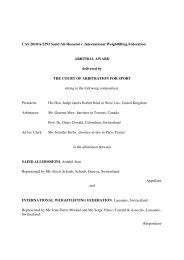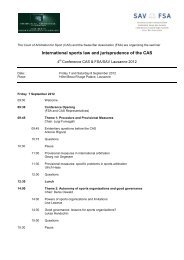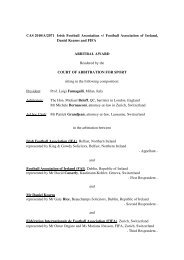(CAS) Bulletin - Tribunal Arbitral du Sport / TAS
(CAS) Bulletin - Tribunal Arbitral du Sport / TAS
(CAS) Bulletin - Tribunal Arbitral du Sport / TAS
You also want an ePaper? Increase the reach of your titles
YUMPU automatically turns print PDFs into web optimized ePapers that Google loves.
or she remains ultimately responsible at all times for<br />
making accurate and complete whereabouts fi lings<br />
(Clause 11.3.6 and Clause 11.3.7(a) ISF). In particular,<br />
it is important that the athlete that delegates such<br />
assignments to a third party makes sure that such<br />
third party effectively forward the whereabouts<br />
information to the anti-doping organization on time.<br />
The rationale of such rule is quite obvious: no athlete<br />
shall be in position to somehow “hide ” behind a<br />
third party, chosen by the athlete himself as a kind<br />
of personal “courier ”. As the rule itself states: it shall<br />
not be a defense to an allegation of a fi ling failure<br />
under Clause 2.4 that the athlete delegated such<br />
responsibility to a third party and that third party<br />
failed to comply with the applicable requirements<br />
(Clause 11.3.7(a) ISF).<br />
It is also correct that an athlete may only be<br />
declared to have committed a fi ling failure when the<br />
responsible anti-doping organization <strong>du</strong>ly notifi ed to<br />
the athlete that he or she failed to comply with that<br />
requirement by the applicable deadline and, in the<br />
case of a second or third fi ling failure in the same<br />
quarter, that he/she was given notice of the previous<br />
fi ling failure and failed to rectify that fi ling failure<br />
by the deadline specifi ed in that notice (Clause 11.3.5<br />
ISF). In particular, the anti-doping organization is<br />
responsible for making an accurate notifi cation to<br />
the athlete. If it decides to notify the fi ling failure<br />
communication to the athlete’s national federation<br />
instead of directly to the athlete, it has to make sure<br />
that the athlete receives such communication from<br />
the national federation. If the athlete does not receive<br />
the fi ling failure communication from the national<br />
federation, he or she may not be declared to have<br />
committed any fi ling failure. Again, the rationale of<br />
this is also quite obvious: the athlete must be informed<br />
adequately so that he or she has a true opportunity to<br />
correct the fi ling defi ciencies that have emerged.<br />
In the case under consideration, the Appellant chose<br />
to delegate whereabouts fi lings to VSF. Despite this<br />
choice, he remained ultimately responsible at all<br />
times for making accurate and complete whereabouts<br />
fi lings to the FINA. For this reason, as mentioned<br />
above, the Appellant should have ensured that the<br />
VSF was acting correctly, for example by asking<br />
the VSF to confi rm the fact that the whereabouts<br />
information was fi led on time.<br />
On the other side, FINA never notifi ed a fi ling<br />
failure communication to the Appellant. In<br />
particular, FINA did not send the letters concerning<br />
the fi ling failures directly to the Appellant, but only<br />
to the VSF, and the Appellant did not receive any<br />
such communications from the VSF before his third<br />
failure. As a consequence, the Appellant was unaware<br />
of all fi ling failures until the third fi ling failure<br />
occurred and was not in a position to repair on that.<br />
In accordance with the ISF rules, a similar restriction<br />
shall apply when the anti doping organization<br />
chooses as recipient of the failure notices a third<br />
party, even if such third party is the one chosen by<br />
the athlete to make his or her fi ling. In other words, it<br />
shall not be a defense to an allegation of non-receipt<br />
of one or more failure notices that the anti- doping<br />
organization delegated such responsibility to a third<br />
party and that third party failed to comply with the<br />
applicable requirements.<br />
Thus, since it is undisputed that Appellant did not<br />
receive any failure notice before the third whereabouts<br />
fi ling failure, the existence of a second and a third<br />
violation cannot be reproached to the Appellant.<br />
For these reasons, no anti-doping rule violation in<br />
the sense of § 2.4 DC (Whereabouts Filing Failures<br />
and/or Missed Tests) exists and, as a consequence, the<br />
Appeal is upheld, the FINA Decision overturned, the<br />
second and third fi ling failure for the fourth quarter<br />
of 2010 and the fi rst quarter of 2011 are cancelled and<br />
the Appellant’s results reinstated.<br />
The above conclusion, fi nally, makes it unnecessary<br />
for the Sole Arbitrator to consider the other requests<br />
submitted by the parties. Accordingly, all other<br />
prayers for relief are rejected.<br />
Jurisprudence majeure / Leading cases<br />
-<br />
175





